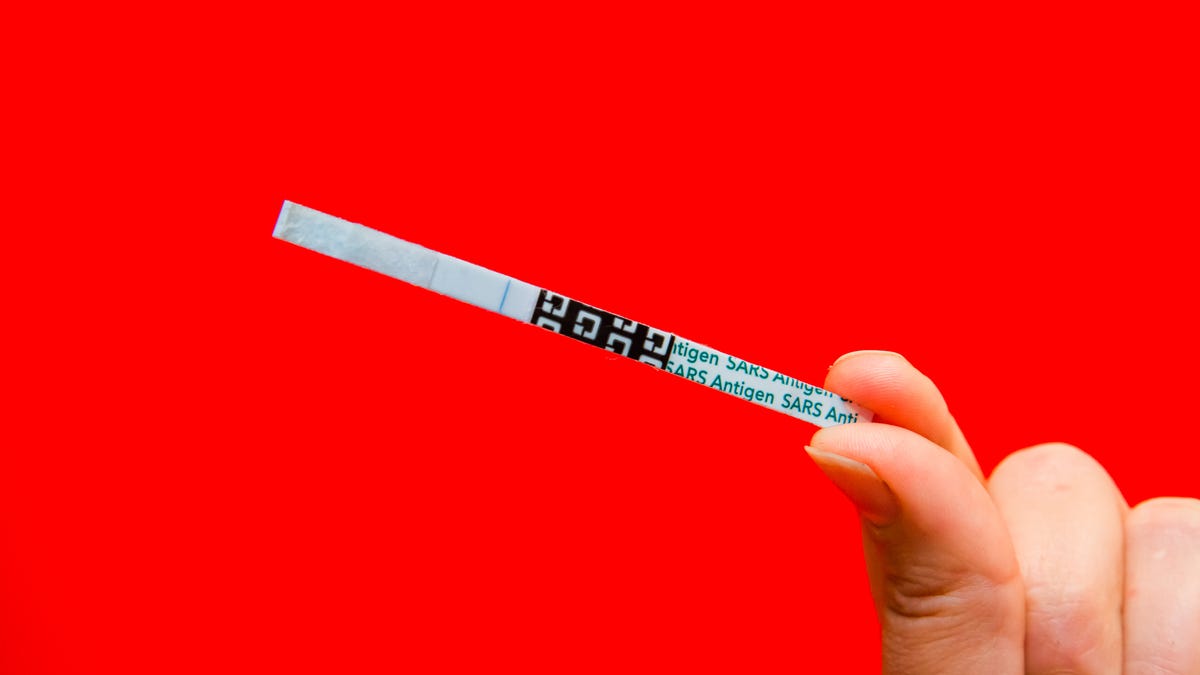How Effective Are COVID Tests at Detecting the New Variant?
“BA.5 is making a lot of people sick right now. Will the home tests measure up?

BA.5 is leading another wave of COVID-19 cases, as well as a rise in hospitalizations. The subvariant of omicron is extremely contagious and is causing more reinfections in people who've already been sick with COVID-19, including during earlier omicron waves.
But are the at-home rapid tests we've come to rely on (and have even gotten shipped to our homes) able to detect BA.5?
While it's possible new research could come out and prove that BA.5 makes some tests less effective at picking up positive COVID-19 cases, the rapid tests seem to be doing their jobs. Here's what to know.
How do home COVID tests work?
At-home COVID-19 tests are usually rapid antigen tests, which work by identifying proteins in the coronavirus. If the proteins are present in your nose when you swab it, there will be a second line on your test, and you should consider yourself positive and contagious with COVID-19. This is similar to how a home pregnancy test works, but pregnancy tests pick up the presence of a hormone instead of a virus. (And pregnancy isn't contagious, of course.)
"Positive results remain highly accurate for these tests, though there still can be false negatives," Shaili Gandhi, vice president of pharmacy at SingleCare, said in an email. This is because it takes a higher amount of virus to test positive on a rapid test than the highly sensitive PCR or lab-based tests. Someone who's fully vaccinated and boosted, for example, may have a very low viral load (smaller amount of virus) and that may mean they test negative even if they do have COVID-19. If that's the case, you might need a lab-based PCR test before COVID-19 is confirmed. (That doesn't mean you shouldn't use a home test if you're boosted, though, but more on that below.)
Read more: Put Down That Cloth Mask. These Are The Best Masks to Help Avoid COVID

Many of us are familiar with the swab, dip, swirl and drip method of testing for COVID-19.
Tang Ming Tung/Getty ImagesDo home tests work against BA.5? When's the best time to test?
Research continues on BA.5, which includes how effective tests are at detecting it, according to Gandhi. But how well the home COVID-19 tests work may have less to do with the subvariant and more to do with when you test.
You're most likely to test positive for COVID-19 when you have symptoms. Similarly, asymptomatic people or someone with mild symptoms might be more likely to have a false negative result than someone who has a lot of symptoms.
"Under these conditions, at-home tests are as effective at detecting omicron as with other variants," Sandra Adams, a professor of biology and virologist at Montclair State University, told New Jersey Advance Media.
"The accuracy varies with when the tests are taken," she added.
Gandhi said a "good rule of thumb" is to take at least two tests, with a day or two between tests. You should also follow the instructions on whatever box you have, which often comes as a pack of two tests, and stay up-to-date on the US Food and Drug Administration's extension of the shelf lives of some home tests.
And, if there are home tests discovered to not work against BA.5, the FDA will remove its authorization of that particular test.
"The FDA would know if there are performance concerns because they continue to monitor all authorized tests and scientific evidence over a period of time in the event that they need to make changes," Dr. Mark Fischer, Regional Medical Director at International SOS, said in an email.
What's BA.5's incubation period?
At the beginning of the omicron surge in December last year, the US Centers for Disease Control and Prevention changed its quarantine guidance based on the understanding people were most contagious with COVID-19 in the one or two days before they developed symptoms, and two to three days after.
While some research suggests BA.5 doesn't have a different incubation period than other versions of COVID-19, some people are reporting testing positive for longer, Gandhi notes. Dr. Eric Topol, a professor of molecular medicine at Scripps Research, noted in a report earlier this month that changes in BA.5 that make it easier to get into cells may explain why some people are taking a long time to test negative.
"For now, while this new variant is still elusive, I recommend testing multiple times with at-home tests, and if symptoms persist [and you're still testing negative], get a PCR test from your pharmacy or doctor," Gandhi said.
And, unfortunately, a positive result on a home rapid test in all likelihood means you have COVID-19. So consider yourself contagious and follow the CDC's guidelines for isolation and masking.
Correction at 8:03 a.m. PT July 26: The spelling of Shaili Gandhi's last name has been fixed.
The information contained in this article is for educational and informational purposes only and is not intended as health or medical advice. Always consult a physician or other qualified health provider regarding any questions you may have about a medical condition or health objectives.“









